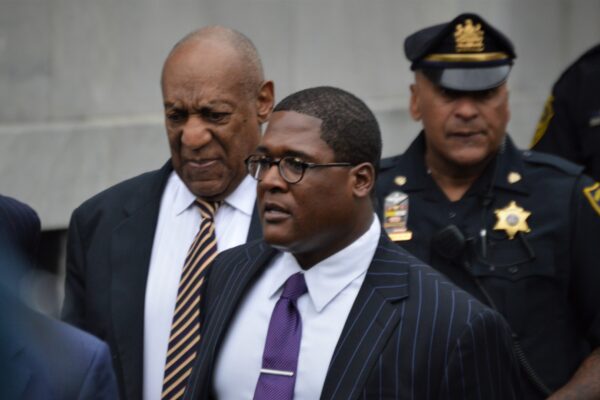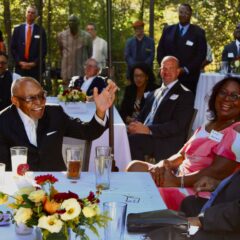Bill Cosby is back in court this week. This time, in Pittsburgh, his sexual assault case is framed against the backdrop of #MeToo, the movement raising awareness of sexual harassment, and #ChurchToo. The faith community, including the Black Church, has faced revelations of sexual assault within our congregations.
For the Black Church, the Cosby case offers both a challenge and an opportunity. So many African Americans looked up to Cosby’s TV family as a model to emulate. He is intimately a part of Black culture, and his influence runs deep. But over the years, more than 50 women have come forward accusing him of rape. Due to statutes of limitation, only one of the allegations has resulted in a criminal case.
It would be easy for pastors to ignore the Cosby story—too controversial, fear of rebuke, or loss of membership and giving. Like many, I have had to struggle to separate my thoughts about Cosby, the persona, and Cosby, the real person. As a survivor of sexual violence and a pastor, though, I know that silence is not an acceptable response. The Cosby case offers an opportunity to start a larger conversation around sexual violence in our community.
I’m not alone in being a victim of sexual violence. Nationally, one in three women and one in six men have been sexually assaulted in their lifetime. If a church has 50 women, at least 16 of them have experienced acts of sexual assault, like the women who have come forward about Bill Cosby’s alleged behavior. If a church has 50 men, at least eight of them have been victims of sexual assault.
If you have 100 people in your church, 10-20 people in your congregation may have committed a crime of sexual assault.
To be silent about Bill Cosby is to miss an opportunity to speak to the real people in our pews. As clergy, we claim that we want to be “relevant” and to address the present culture. But quoting rappers doesn’t equate to relevance. The outpouring of people sharing their stories with the #MeToo and #ChurchToo hashtags shows that sexual violence is relevant.
I will never forget one of the responses to a sermon I preached on sexual violence. As I exited the sanctuary, a man about 6’2″ approached me and said, “Pastor Juju, thank you for what you said about men and women being victims. I was molested when I was a boy, but I never told anyone because I was afraid of what people might say.”
The Cosby case allows us to deconstruct stereotypes about both victims and sexual predators. No one would have ever believed Bill Cosby could do these things. Not the Coogi sweater man!
But rapists, molesters and pedophiles do not all wear black masks and lurk in dark places. Many perpetrators know their victims from their family and social circles—even from their faith communities.
Meanwhile, when the accusations against Cosby first aired, many claimed the women could not be real victims, because many of them are successful white women. When the incidents allegedly happened, some were young aspiring actresses, used recreational drugs and were looking for an easy way up the entertainment ladder. The implication is that their tears aren’t real and their stories are untrue.
The same holds true, sadly, for most of the 13 victims (that we know of) in the Daniel Holtzclaw case. A serial rapist, Holtzclaw—a police officer—bet that no one would believe the stories of his victims because they were black women with tainted records, drug offenses and questionable lifestyles.
A pastor cannot look out into the congregation and guess who’s a survivor of sexual assault—or who’s a perpetrator. Victims and perpetrators alike sit in the pews, serve on the board, sing in the choirs, shout in the aisle and tithe faithfully.
We can’t know who are survivors, but we can speak to their pain, create space for healing and hope, and remind them that God sees them and loves them. And by lifting the issue, we can make sure perpetrators know that they have the opportunity to repent and seek help.
Crimes of this nature thrive in secrecy and silence. To be silent about Bill Cosby makes it easier for the “Cosby” in our pews to sit comfortable and unaccountable. And to be silent is to be complicit with a prevailing rape culture.
I especially urge my dear brother pastors to raise your voices against sexual violence. There has always been a loud cadre of women lifting up “women’s issues.” But it wasn’t until a male comedian, Hannibal Buress, made his joke about Bill Cosby raping women, that the real firestorm happened: A journalist got on the case, dozens of women started coming forward, court documents were unsealed and now an official charge has been brought.
The criticism that victims face, the shame they carry and the sense that they will not be believed lead victims to not reporting the crime. They feel the justice system will not be on their side, and they hear no voices outside of the system calling for justice. And in court, victims face being re-victimized by questions suggesting his or her story is untrue. When they don’t hear their faith leaders supporting them—telling them that there is nothing wrong with them—and holding predators accountable, this too is a miscarriage of justice.
To be sure, rape is an uncomfortable topic to talk about. Pastors run the risk of upsetting major contributors, facing rebuke and losing members because the message is too controversial. These are real concerns for clergy.
But this issue is bigger and broader than Bill Cosby. This is not just about a person, but a culture and systems of oppression and injustice. It’s also about the need for restoration and healing.
Today we have an opportunity to use our various platforms to speak out against sexual assault—it’s the relevant issue, and the moment is today. We can’t be prophetic and silent.
Photo Credit: Montgomery County Planning Commission / Flickr
Rev. Najuma Smith is Assistant Director of Community and Public Engagement with the USC Center for Religion and Civic Culture.


